 Edo Hipsterism and Ugachi Irony
Edo Hipsterism and Ugachi Irony
As the literature of Edo blossomed in the late 18th century, writers came to fixate on a new social type: the paragon of fashionable, urban masculinity known as the sophisticate (tsū), fawned over by his courtesan lovers and alternately admired and envied by his male peers. But in proportion to the discourse built up around this figure, the literature of the time rarely offers concrete images of the sophisticate, nor comes to any meaningful consensus as to the nature of his sophistication. This lecture uses a study of this enigmatic figure to explore the nature of the cross-status communities of taste, mediated by woodblock printed text, that formed around the Edo demimonde. Careful reading of “books of wit” (sharebon) across the 18th century reveals that the sophisticate was ultimately not a social figure so much as a literary one—a phantasm used to stage irresolvable debates over cultural capital. However, acknowledging the fictionality of this figure was the key to an ethos of irony that unified a socially diverse community of writers and readers.
Thomas received his Ph.D. in Japanese Literature from Columbia University in 2016. His research interests are primarily in early modern Japanese literature, media, and society, with a focus on the role played by literature in conceptualizing urban space and the identities that it engenders. His research is also concerned with the mutual implications of literary history, material histories of the book, interpretation, and social history. His current project examines the ways in which different genres of popular narrative fiction registered and reflected upon shifts in the discourses and practices structuring urban commoner identity between the late 17th and 19th centuries. His other primary research focus is media theory and history, especially the history of commercial publishing in Japan and media-theoretic approaches to the woodblock-printed book.
